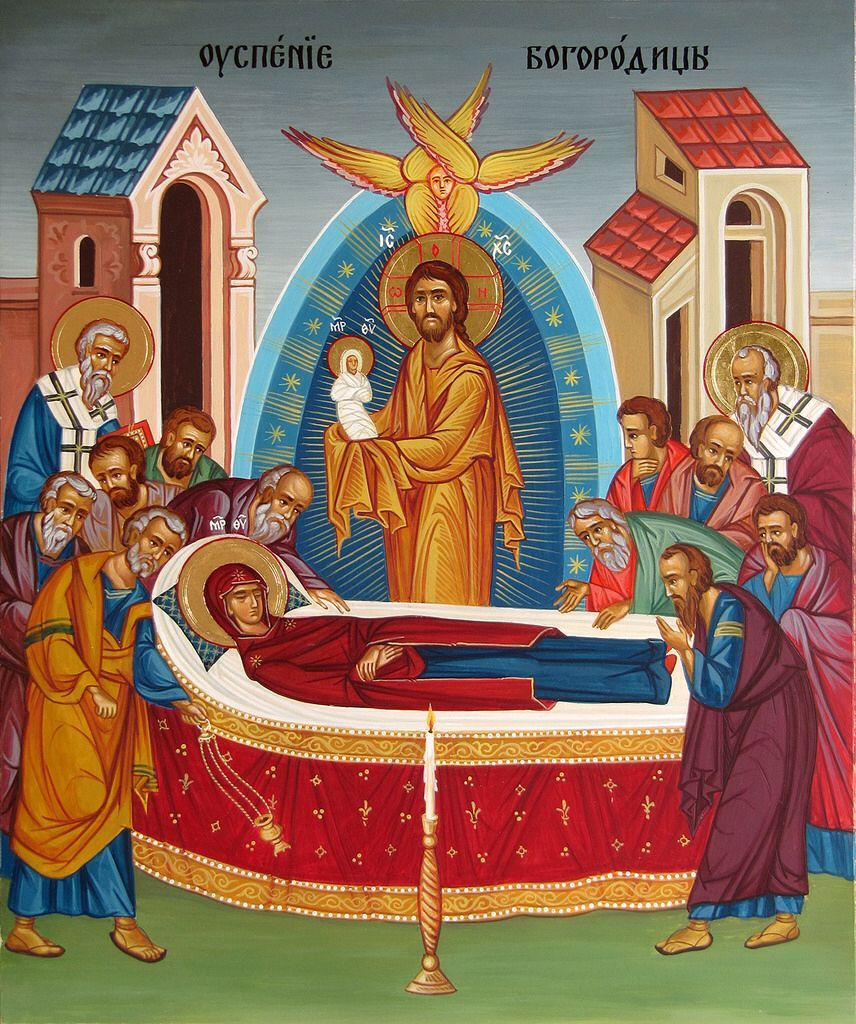One thing that the Catholic and Orthodox Churches are known for is their devotion to Mary. Catholics and Eastern Orthodox all pray to the Virgin Mary, asking her intercession with God. Another thing we are known for is an attachment to relics. There are first-class relics of saints, little pieces of their bones. There are second-class relics, items that belonged to saints, especially clothing. And finally, there are the little third-class ones, pieces of cloth touched to a relic. In Churches that have nurtured devotion to relics since the first century of Christianity, we have no first-class relics of Jesus or of his mother Mary. Right there are proofs for the Resurrection of Christ and the bodily assumption of Mary into heaven. There is a cloth, which is claimed to be her belt, that is kept in Italy, but that’s it. The Dormition refers to her falling asleep in the Lord, to her dying. The icons all show her lying on her deathbed, with Jesus holding her soul and coming to lift up her body and take it to heaven. That of course is the main part of this feast, her bodily assumption and reunification of her body and soul.
According to a very ancient legend when it came time for the Virgin Mary’s earthly life to end, all of the Apostles were miraculously brought to Jerusalem from around the world to be present for her death; but poor St. Thomas, however, was late again. After all, his angel had to bring him all the way from India. When she had died, they buried her body in a tomb in the valley of Kidron. St. Thomas arrived in Jerusalem, and wished to venerate the body. On opening the tomb, the Apostles discovered that it was nowhere to be found, but the tomb was filled with flowers and herbs, hence the blessing we are doing tonight. One legend speaks of the belt which the Virgin then gave to St. Thomas. One says that Mary, knowing Thomas’ propensity to doubt, appeared above the empty tomb as the Apostles stood around it, and then removed Her belt and gave it to him as an enduring proof of the Assumption, just as Her Son had allowed him to place his finger in the wound in His side. But another version, following the story that Thomas had believed in the Assumption before going to the tomb, appeared to him and gave him the belt as a reward for his faith. Either way, that’s the cloth that is still venerated in the town of Prato, near Florence. That garment is the only relic directly associated with Our Blessed Lady.
There are all kinds of blessings associated with this feast – in central Europe one can partake of blessings of fields, farms, and livestock; in Germany and Italy there is the blessing of herbs, and fruit; in southern Europe and parts of the American coast in places like Louisiana and Georgia there are blessings of boats; in Armenia it’s the day to bless the grapes harvested from the vineyards. The idea is that our Lady’s assumption into heaven, body and soul, should be an occasion of great joy and celebration, a time for the Church to really celebrate. The blessing of the herbs is a reminder that Our Lady intercedes for the sick because she is untouched by the decay of death, through the mercy of God, but like us, and like her Son, she had to die.
The Dormition of Mary is a sign to all of our destiny – to be raised in our bodies, and to be reunited body and soul, in fulfillment of what we profess in the Nicene Creed – that we believe in the resurrection of the dead. Although our Lady would have been rather elderly by the standards of the first century, in all of the accounts of her apparitions, from the 200s on, Mary is always described as being young, beautiful, and gracious. Here is the example of how we will be after the resurrection of the dead – our glorified bodies will not be restored to the condition they were at our deaths, but rather to the state of beauty without the disfigurement caused by the wounds of sin.
It also confirms science – mothers carry their children’s DNA in them after birth, especially in the heart and blood, and in particular male DNA is carried in mothers’ brains. Jesus was true God and true Man, and so Our Lady would have carried his DNA and fetal cells in her, from a body that could never decay or experience corruption. In the Divine Office it says that God did not allow her to undergo corruption, and that is certainly the case not only in terms of dogma but also of medical science.
Mary’s Dormition and Assumption confirm her immaculate conception – she went straight to heaven, body and soul, not subject to corruption. It confirms her unique connection with God, spared from the corruption of death that original sin brought about. It confirms her as the Theotokos – she is not subject to decay precisely because of her role as the Mother of the Incarnate Lord, as God honors her and preserves her. Jesus’ resurrection defined Christ’s victory over sin and death, and Mary’s bodily assumption after her death confirms her role as the first disciple, and her role as the mother of all Christians. She stands in heaven as the glorified Mother of God, but also as the model for all of us as to how we will live one day with God after the Last Judgment – soul and glorified body reunited, able to enjoy the Beatific Vision of the Holy Trinity forever. May we ask her intercession as our mother who perpetually prays for us to intercede for us, and to obtain God’s great mercy for us.




Leave a comment